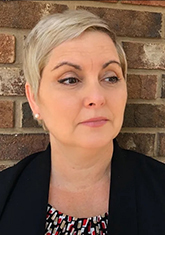EXPANDING EXPERIENTIAL: 1L STUDENTS ENGAGE IN COURT WATCHING TO INCREASE PRACTICE-BASED UNDERSTANDING AND FUEL IDEAS FOR JUSTICE REFORMS
 December 2022 — This fall Civil Procedure students in Associate Dean Mae C. Quinn’s class participated in two different court watching exercises in an effort to move them from book-based learning to experience-rooted understanding of the legal system in action.
December 2022 — This fall Civil Procedure students in Associate Dean Mae C. Quinn’s class participated in two different court watching exercises in an effort to move them from book-based learning to experience-rooted understanding of the legal system in action.
First, students “zoomed” into Immigration Court as a group. As a result, they were able to watch part of the daily docket of Judge Kuyomars Golpavar, an adjunct professor at Penn State Dickinson Law who kindly welcomed remote attendance on the part of the class. This experience allowed students to witness first-hand how attorney representation can make a difference for persons dealing with immigration matters and brought to life many of the lessons they learned from reading cases like Lassiter v. Department of Social Services. They also witnessed first-hand the volume of cases being heard on any given day, the deeply technical nature of the vocabulary used which might be difficult for interpreters to translate, and the challenges for youth respondents attempting to navigate the immigration system.
Second, each student was required to attend court proceedings somewhere in the community to be physically present in the courthouse and watch matters unfold in the courtroom and beyond. Students attended both state and federal proceedings in Pennsylvania and elsewhere. During a class session students reported back on their observations and findings, comparing what they saw to what is provided by the rules of civil procedure and what they read about in the cases in their textbook. Students offered a range of important insights including: the humanity of many judges seeking to be fair while operating within legal standards and constraints they did not create; very real challenges for indigent persons who might not be able to afford counsel or even parking at court; and racial, ethnic, gender and other differences between members of the bench/bar and individuals present in court with pending cases.
As described in her article, “Against Professing,” Associate Dean Quinn has used court watching as a teaching and advocacy tool for many years in clinics and beyond, including working collaboratively with law students and groups like CourtWatchPG in Maryland to press for court improvements. Several students from Quinn’s Civil Procedure class, following their court watching experience, are now working to launch a public service initiative to provide immigration support locally. Others are joining with Quinn to help shape other experiential programs and offerings, including a possible jail-based legal education program.
Professor Mae C. Quinn brings over 25 years of experience as a practicing attorney, civil rights advocate, and leader in the legal academy to her role as associate dean of experiential education. She has successfully taught across the entire law school curriculum, including legal writing, doctrinal, seminar, field placement/practicum, trial advocacy, and clinical legal education courses. She and her law students have also recently filed amicus briefs with the United States Supreme Court and state high courts in several important criminal and youth justice matters. Her scholarship, cited widely by courts, advocates and academics alike, has been published in leading journals including the Boston College Law Review, BYU Law Review, Iowa Law Review, SMU Law Review, Wake Forest Law Review, Washington and Lee Law Review, Harvard Journal of Gender and Law, and New York University Review of Law and Social Change.